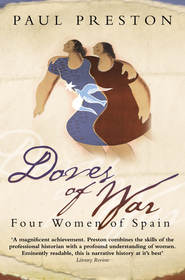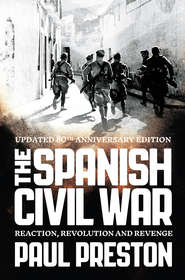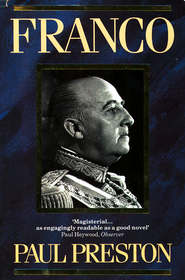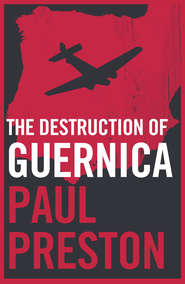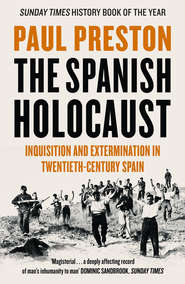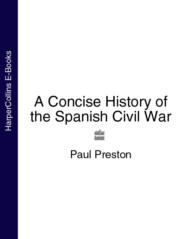По всем вопросам обращайтесь на: info@litportal.ru
(©) 2003-2024.
✖
Juan Carlos: Steering Spain from Dictatorship to Democracy
Настройки чтения
Размер шрифта
Высота строк
Поля
While nonplussed by the clear evidence that Franco had no immediate intentions of restoring the monarchy, Don Juan was encouraged by the appointment of Martín Artajo, whom he trustingly regarded as one of his supporters. It was the beginning of a process in which Don Juan was to be cunningly neutralized by Franco. As part of a plan to drive a wedge between Don Juan and his more outspoken advisers, Gil Robles, Sainz Rodríguez and Vegas Latapié, Franco encouraged conservative monarchists of proven loyalty to his regime to get close to the royal camp. One of the most opportunistic of these was the sleekly handsome José María de Areilza, a Basque monarchist who had been closely linked to the Falange in the 1930s. Areilza had acquired the aristocratic title of Conde de Motrico through marriage and his impeccable Francoist credentials had been rewarded when he was named Mayor of Bilbao after its capture in June 1937. In 1941, he wrote with Fernando María Castiella, the ferociously imperialist text Reivindicaciones de España (Spain’s Claims) and had aspired to be Ambassador to Fascist Italy. After the War, he moved back to the pro-Francoist monarchist camp, and would be named Ambassador to Buenos Aires in May 1947. His visits to see Don Juan were dutifully reported to the British Embassy to give the impression that Franco was negotiating the terms of a restoration and so buy him more time.
(#litres_trial_promo)
The wisdom of Franco’s policy, and the waning prospects of Don Juan, were both illustrated by the relatively toothless Potsdam declaration which reiterated Spain’s exclusion from the United Nations but made no suggestion of intervention against the Caudillo. Statements from the British Labour government that nothing would be done that might encourage civil war in Spain heartened the Caudillo further.
(#litres_trial_promo) Don Juan would have been even gloomier had he known of a report on the regime’s survival drafted at this time by Franco’s ever more influential assistant, Captain Carrero Blanco. It was a brutally realistic document which rested on the confidence that, after Potsdam, Britain and France would never risk opening the door to Communism in Spain by supporting the exiled Republicans. Accordingly, ‘the only formula possible for us is order, unity and hang on for dear life. Good police action to anticipate subversion; energetic repression if it materializes, without fear of foreign criticism, since it is better to punish harshly once and for all than leave the evil uncorrected.’ There was no place for Don Juan in that future.
(#litres_trial_promo) On 25 August 1945, Franco sacked Kindelán as Director of the Escuela Superior del Ejército (Higher Army College) for making a fervently royalist speech predicting that the Pretender would soon be on the throne with the full support of the Army.
(#litres_trial_promo)
Anxious to establish control over Don Juan, in the autumn of 1945, Franco through intermediaries suggested that if the heir to the throne took up residence in Spain, he would be provided with a royal household fit for a future King. The message, passed on by Miguel Mateu Pia, the Spanish Ambassador in Paris, made it clear that Franco had no intention of any sudden change. He was merely looking for a way of placating both the Great Powers and the monarchist conspirators in the Army. Don Juan had no desire to become the Caudillo’s puppet and was still hopeful of military action to overthrow the regime. Accordingly, he rejected the offer out of hand – commenting ‘I am the King. I do not enter Spain by the back door.’ The refusal was underlined when Don Juan told La Gazette of Lausanne that the need to ‘repair the damage done to Spain by Franco’ made the restoration of the monarchy an urgent necessity. He denounced Franco’s regime as ‘inspired by the totalitarian powers of the Axis’ and spoke of his intention to re-establish the monarchy within a democratic system similar to those of Britain, the United States, Scandinavia and Holland.
(#litres_trial_promo)
On 2 February 1946, Don Juan and his wife moved to the fashionable but sleepy seaside resort of Estoril, west of Lisbon. An area of splendid mansions built for the millionaire bankers and shipbuilders of the nearby capital, its silent isolation was disturbed only by the click of chips falling in the casinos. The eight-year-old Juan Carlos, to his considerable distress, was left behind in Switzerland, where he was by now being educated by the Marian fathers in Fribourg. For the first two months in Portugal, his family lived in Villa Papoila, loaned by the Marqués de Pelayo, later moving in March 1946 to the larger Villa Bel Ver. They stayed there until the autumn of 1947 when they moved to Casa da Rocha, until finally in February 1949, they established their residence at Villa Giralda. In 1946, for many of Don Juan’s supporters, his proximity to Spain seemed to shorten the distance that separated him from the throne. His mere presence in the Iberian Peninsula set off a wave of monarchist enthusiasm. The Spanish Foreign Ministry was inundated with requests for visas as senior monarchists set off to pay their respects.
(#litres_trial_promo)
Franco’s Ambassador to Portugal, his brother Nicolás, quickly established a superficially cordial relationship with Don Juan. However, when Nicolás suggested he drive him to Madrid for a secret meeting with the Caudillo, Gil Robles, Don Juan’s senior adviser, was adamant: ‘Your Majesty cannot go and see Generalísimo Franco on Spanish soil since he would be going there as a subject.’
(#litres_trial_promo) Indeed, it had been the expectation of tension with Franco that had led Don Juan to decide that it was better for Juan Carlos to remain in Switzerland. The wisdom of his decision was underlined when the Caudillo lashed out in response to the publication on 13 February 1946 of a letter welcoming Don Juan to the Peninsula, signed by 458 prominent establishment figures. Franco reacted as if he was faced with a mutiny by subordinates rather than an attempt to accelerate a process to which he had publicly committed himself. He told a cabinet meeting on 15 February, ‘This is a declaration of war, they must be crushed like worms.’ In an astonishing phrase, he declared, ‘the regime must defend itself and bite back deeply.’ He relented only after Martín Artajo, General Dávila and others had pointed out the damaging international repercussions of such a move. He then went through the list of signatories, specifying the best ways of punishing each of them, by the withdrawal of passports, tax inspections or dismissal from their posts.
(#litres_trial_promo)
While these high political dirty tricks were going on, the eight-year-old Prince was sent to a grim boarding school at Ville Saint-Jean in Fribourg, run by the stern Marian fathers. Juan Carlos would later recall his distress at being separated from his family and from his tutor Eugenio Vegas Latapié, of whom he had become fond. ‘At first, I was really very miserable, because I felt that my family had abandoned me, that my mother and father had just forgotten all about me.’ Every day he waited for a telephone call from his mother that never came. It must have been the harder to bear because of the gnawing suspicion that his parents’ favourite was his younger brother Alfonso, who remained at home with them. Only later did he discover that his father had forbidden his mother to phone him, saying, ‘María, you’ve got to help him become tougher.’ Later on, Juan Carlos tried to explain away his father’s actions – ‘It was not cruelty on his part and certainly not a lack of feeling. But my father knew, as I would later know myself, that princes need to be brought up the hard way.’ Juan Carlos had to pay a terrible price in loneliness – ‘in Fribourg, far from my father and my mother, I learned that solitude is a heavy burden to bear.’ The most visible consequences of the apparent harshness of his parents’ treatment would be his perpetually melancholy expression and a silent reserve.
In later endeavouring to explain away his father’s motivation, Juan Carlos inadvertently shed light on his own life as an eight-year-old, far from his parents: ‘My father had a deep sense of what being royal involved. He saw in me not only his son but also the heir to a dynasty, and as such, I had to start preparing myself to face up to my responsibilities.’
(#litres_trial_promo) Despite such rationalizations, it is clear that it was difficult for Juan Carlos ever to reconcile himself to this early separation. (His own son, Felipe, would not be sent to boarding school at such a young age and did not leave home for the first time until he was 16, in order to spend his last year at school at the Lockfield College School in Toronto, Canada.) Indeed, in a 1978 interview for the German conservative paper Welt am Sonntag, Juan Carlos would describe his departure for Ville Saint-Jean in more heartfelt terms: ‘going to boarding school meant saying goodbye to my childhood, to a worry-free world full of family warmth. I had to face that initial difficult period of separation from my family all alone.’
(#litres_trial_promo)
Even when phone calls from home were finally permitted by Don Juan, they remained, for a long time, few and far between. This silence from his parents must have been very painful, since Juan Carlos was given no explanation. It was hardly surprising that he felt that they had simply forgotten him. His unhappiness at Ville Saint-Jean was intensified by the fact that he quickly fell foul of the school’s rigid discipline. His teachers there would later remember him as a handsome but indisciplined eight-year-old of average intelligence, with a lively sense of humour. They considered him to have been spoilt by overindulgent nannies in the past: ‘they had let him get away with virtually everything so that he considered himself as lord and master wherever he happened to be.’ Father Julio de Hoyos, one of Juan Carlos’s teachers, recalled how the Prince refused to attend his first class at the school: he had physically to carry the boy to the classroom and then to slap him in order to make him sit quietly and pay attention. No one seems to have considered that the boy’s behaviour and poor academic performance were symptoms of his desperate unhappiness at being separated from his parents.
(#litres_trial_promo)
In November 1980, Juan Carlos recounted to the English biographer of his grandmother his vivid memories of how important Queen Victoria Eugenia was to him during this period. She frequently visited him at his school. Although deeply conscious of the responsibilities of royalty, she had a warm relationship with him. Remembering her own difficulties with the Spanish language when she first arrived in Madrid at the turn of the century, she was determined that Juan Carlos would not suffer embarrassment or criticism as a result of having a foreign accent. Having been brought up in Italy and Switzerland, speaking French as much as Spanish, he had a noticeable accent, particularly in his pronunciation of the crucial letter ‘r’. The majority of the pupils at Ville Saint-Jean were French and all classes were in French. Victoria Eugenia taught him to trill the ‘r’ in the Spanish style and to drop the French explosive ‘r’ which sounds so comical to Spaniards.
(#litres_trial_promo) At the beginning of the 1946 Christmas holiday, Victoria Eugenia accompanied Juan Carlos on his trip back to Estoril. On the boy’s arrival, Eugenio Vegas Latapié, Don Juan’s political secretary, resumed his duties as tutor, in order to prepare him for his future royal tasks, and would also accompany him back to Switzerland after the holidays. Astonishingly, Vegas was allowed to smack the Prince when he was naughty – although without hurting him. Despite Vegas Latapié’s intellectually imposing and austere character, they had established a good relationship. He laid the basis for the boy’s later conservatism – along with emphasis on Spain’s one-time imperial glories, he taught him the anthem of the Spanish Foreign Legion, which Juan Carlos would find profoundly moving thereafter.
(#litres_trial_promo) Before Don Juan had left Lausanne, Father Carles Cardó, the distinguished Catalan theologian, in exile in Switzerland, said to him, ‘Sir, be careful that Eugenio Vegas Latapié doesn’t turn the Prince into a new Philip II.’ By this stage, Juan Carlos was already exhibiting an emotional (though naïvely expressed) concern for Spain’s internal affairs. Vegas Latapié remembers that one day, the Prince told him that he had ‘promised God not to eat chocolates again until an important political event takes place in Spain’. Vegas Latapié replied that this seemed rather too big a promise for a child to make and that he might not be able to eat chocolates for a very long time if he kept it. When Juan Carlos asked him what he should do, Vegas Latapié replied that he ought to go to confession. He then absolved him of his promise and told him not to make similar ones in the future.
(#litres_trial_promo)
Franco’s anger at the monarchist enthusiasm generated by Don Juan’s arrival in Portugal continued to fester. He sent a note to Don Juan breaking off relations between them on the grounds that he had given his permission only for the Pretender to make a two-week visit to Portugal, yet he and his Privy Council were fomenting monarchist conspiracy against him. Franco acted out of pique, but there was a strong element of calculation in his reaction. The more daring monarchists now began to seek contacts on the left but many of the more opportunistic conservatives who had signed the letter welcoming Don Juan scuttled back to Franco.
(#litres_trial_promo) In response, at the end of February 1946, Don Juan attempted to woo a broad spectrum of Spanish opinion, including the ultra-conservative Carlists, by issuing another manifesto, known as the Bases de Estoril. It was a draft constitution for the monarchy and contrasted with the earlier Lausanne Manifesto in promising a brand of Catholic corporatism. The Bases de Estoril did not succeed in convincing the Carlists, but the document did antagonize his more liberal supporters.
(#litres_trial_promo)
In fact, all was not well within Don Juan’s camp. Vegas Latapié tended to place considerable hopes on Allied intervention to restore the monarchy. On 4 March 1946, a Tripartite Declaration of the United States, Great Britain and France announced that: ‘As long as General Franco continues in control of Spain, the Spanish people cannot anticipate full and cordial association with those nations of the world which have, by common effort, brought defeat to German Nazism and Italian Fascism, which aided the present Spanish regime in its rise to power and after which the regime was patterned.’ Pedro Sainz Rodríguez, however, argued vehemently that the real significance of the Declaration lay in the statement that: ‘There is no intention of interfering in the internal affairs of Spain. The Spanish people themselves must in the long run work out their own destiny.’ Sainz Rodríguez would argue, against the views of Vegas Latapié and Gil Robles, that Don Juan must seek some rapprochement with the Caudillo.
(#litres_trial_promo)
Don Juan was sufficiently concerned by the hostility emanating from Franco and the Falange to instruct Juan Carlos’s teachers at Ville Saint-Jean to destroy any gifts of sweets, chocolates and other delicacies sent to the Prince by well-wishers, for fear of attempts to poison him. Eventually, Don Juan became uneasy about Juan Carlos being left alone in Switzerland and finally, in April 1946, called for his son to rejoin the family at Estoril. It opened a brief period of relative normality, with the boy able to attend a local school, the Colegio Amor de Deus. He made many friends and could spend time with his family and pursuing hobbies like horse-riding, sailing and football.
(#litres_trial_promo) Juan Carlos’s education at Estoril remained under the overall supervision of Vegas Latapié. In spite of his tutor’s rigid conservatism and insistence on discipline and formality, the young Prince became increasingly attached to him, later describing him as ‘a wonderful man’. According to Juan Carlos, Vegas Latapié believed that the heir to the throne: ‘should be educated with no concession to the weaknesses that seem normal to commoners. Accordingly, he brought me up to understand that I was a being apart, with many more duties and responsibilities than anyone else.’
(#litres_trial_promo)
In early December 1946, the United Nations denounced the Axis links of Franco and invited him to ‘surrender the powers of government’. It was highly unlikely that there would be any Allied intervention against the Caudillo, but Franco responded as if there was such a threat by mounting a massively orchestrated popular demonstration in the Plaza de Oriente on 9 December. On 12 December, a plenary session of the General Assembly resolved to exclude Spain from all its dependent bodies, called upon the Security Council to study measures to be adopted if, within a reasonable time, Spain still had a government lacking popular consent; and called on all member nations to withdraw their ambassadors.
(#litres_trial_promo) At the cabinet meeting on 13 December, Franco crowed that the United Nations was ‘fatally wounded’.
(#litres_trial_promo)
Nevertheless, Franco put considerable effort into making his regime more acceptable to the Western democracies. On 31 December 1946, Captain Carrero Blanco drafted a memorandum urging Franco to institutionalize his regime as a monarchy and then give it the veneer of ‘democratic’ legitimacy with a referendum. Building on the ideas first discussed in cabinet in April 1945, it was clearly an attempt to counter the threat of Don Juan as perceived by Franco. There could be no other interpretation to the central argument that the ‘personal deficiencies’ of any hereditary monarch could be neutralized by Franco remaining as Head of State and the King being subject to the advice of his vacuous consultative body, the Consejo del Reino, made up of loyal nominees of Franco. The Caudillo knew that an even simpler solution was never to restore the monarchy in his lifetime. Carrero Blanco’s memorandum was thus refined further in another working paper presented on 22 March 1947, which suggested that Franco name his own royal successor.
(#litres_trial_promo)
Franco quickly implemented Carrero Blanco’s plans to give his regime the trappings of acceptability. Carrero Blanco’s ideas formed the basis of a draft text of the Ley de Sucesión (Law of Succession) and were discussed in a cabinet meeting on 28 March 1947. The first Article declared that: ‘Spain, as a political unit, is a Catholic, social and representative state which, in keeping with her tradition, declares herself constituted as a kingdom.’ The second Article declared that: ‘The Head of State is the Caudillo of Spain and of the Crusade, Generalísimo of the Armed Forces, Don Francisco Franco Bahamonde.’
(#litres_trial_promo) The regime’s Axis connections would simply be painted over with a monarchist veneer. The declaration that Franco would govern until prevented by death or incapacity, the Caudillo’s right to name his own royal successor, the deafening silence on the royal family’s rights of dynastic succession, the statement that the future King must uphold the fundamental laws of the regime and could be removed if he departed from them – all this showed that only the label had changed.
This elaborate deception aimed to buy time from both the Western Allies and monarchists inside Spain. Its success was dependent upon Don Juan speaking the right lines and not denouncing it. That part of the show was handled with notable clumsiness. On the day before the Ley de Sucesión was to be made public, Carrero Blanco arrived in Estoril. He carried an emolient message to Don Juan, implying that if he identified himself with the regime and were patient, he could be Franco’s heir. Carrero Blanco had been ordered by Franco to seek an audience for precisely 31 March, in order to deny Don Juan the possibility of doing anything to impede the project that was to be announced that evening. Believing that he was being consulted about a draft, Don Juan candidly told Carrero Blanco that Franco could hardly pretend to be the restorer of the monarchy when he was prohibiting monarchist activities. Regarding the issue of his identification with the regime, he told Franco’s emissary of his determination to be King of all Spaniards. This stung Carrero into a blunt statement of the Francoist view of politics: ‘In Spain in 1936 a trench was dug; and you are either on this side of the trench or else on the other … You should think about the fact that you can be King of Spain but only of the Spain of the Movimiento Nacional: Catholic, anti-Communist, anti-liberal and fiercely free of any foreign influence in its policies.’
(#litres_trial_promo) As he took his farewell, Carrero Blanco said nothing when Don Juan promised to read the text of the Ley de Sucesión and give him his opinion the next day.
When Don Juan had retired to his rooms, Carrero slipped back to the Villa Bel Ver and left a message with an official of the royal household that Franco would be going on national radio that night to announce the definitive text of the new law. He left hastily before Don Juan was given the message. At a dinner party attended by members of the Spanish Embassy in Lisbon, Don Juan gave vent to his fury at Carrero Blanco, saying, ‘that bastard Carrero came to try to shut me up.’ The remark was duly reported back to Madrid and ensured Carrero Blanco’s undying resentment of Don Juan. In the medium term, this cheap deception inclined Don Juan and his advisers to strengthen their links with the left-wing anti-Franco opposition.
(#litres_trial_promo) On 7 April 1947, Don Juan issued the ‘Estoril Manifesto’ denouncing the illegality of the succession law’s proposed alteration of the nature of the monarchy without consultation with either the heir to the throne or the people. Franco, Martín Artajo and Carrero Blanco agreed that Don Juan had thereby eliminated himself as a suitable successor to the Caudillo.
On 13 April, the Observer, the BBC and the New York Times published declarations by Don Juan – drawn up by Eugenio Vegas Latapié and Gil Robles, in collaboration with the exiled Spanish scholar Rafael Martínez Nadal – to the effect that he was prepared to reach an agreement with Franco only if it was limited to the details of the peaceful and unconditional transfer of power. Since Don Juan had declared himself in favour of a democratic monarchy, the legalization of political parties and trade unions, a degree of regional decentralization, religious freedom and even a partial amnesty, Franco was livid. He later told his faithful confidant and head of his military household, his cousin Francisco Franco Salgado-Araujo ‘Pacón’, that it was the Observer interview that led him to contemplate Juan Carlos as his eventual successor. He unleashed a furious press campaign against Don Juan, denouncing him as the tool of international freemasonry and Communism. The fury of his reaction intensified the divisions within Don Juan’s group of advisers. Against the anti-Franco line of Eugenio Vegas Latapié and José María Gil Robles, Pedro Sainz Rodríguez had come to the conclusion that Franco increasingly held all the cards and thus advocated a tactic of conciliation towards him. Distressed by the press assault, Don Juan began to incline towards Sainz Rodríguez’s view. In consequence, in the autumn of 1947, Vegas Latapié resigned as his secretary.
(#litres_trial_promo)
The Ley de Sucesión was rubber-stamped by the Cortes in June and endorsed by a carefully choreographed referendum on 6 July 1947.
(#litres_trial_promo) Long before this plebiscite, Franco had been, in every respect, acting as if he were King of Spain, even dispensing titles of nobility. Ironically, as part of the campaign for the referendum, spectacular propaganda was made out of the visit to Spain by the glamorous María Eva Duarte de Perón (Evita) in June 1947. The publicity given to the visit implied that Evita had come just to see Franco, and the Movimiento press omitted to mention that she was also visiting Portugal, Italy, the Vatican, Switzerland and France. In Portugal, she visited Don Juan. Greeting him effusively – according to José María Pemán, she kissed him on both hands and part of his forearm – she had no hesitation in giving him a spot of advice about the Ley de Sucesión. Take the crown from whoever offers it,’ she told him, ‘you’ll have plenty of time later to give him a good kick in the backside.’ When Don Juan stopped laughing, he replied, ‘There are certain things that a lady can say and a King cannot do.’
(#litres_trial_promo)
Meanwhile, the now nine-year-old Juan Carlos exhibited a precocious concern for events in Spain. In January 1947, shortly after his first communion, Don Juan had suggested to one of the monarchists who had come from Spain, José María Cervera, that he give the Prince an account of the Spanish Civil War. Juan Carlos reacted by asking: ‘And why does Franco, who was so good during the war, treat us so badly now?’
(#litres_trial_promo) However, Don Juan came to realize that sporadic contact with monarchists, fascinating though it might be for the young Prince, hardly added up to an education. Accordingly, the happy period, just 18 months, that Juan Carlos had been able to spend in Estoril came to an end. In late 1947, Don Juan sent his son back to the severe Marian fathers of Ville Saint-Jean, again under the supervision of Vegas Latapié.
The promulgation of the Ley de Sucesión, and its potential permanent exclusion of his family from the Spanish throne, led Don Juan to seek wider support for a restoration. In London for the wedding of Princess Elizabeth and Lieutenant Philip Mount-batten on 20 November 1947, Don Juan had a brief meeting with Ernest Bevin, the British Foreign Secretary. He also met State Department officials in Washington in the spring of 1948. He was forced to accept that, in the context of the Cold War, the Western powers had little stomach for the removal of Franco. In an effort to convince them that the departure of the dictator would not lead to another civil war, throughout the first eight months of 1948, Gil Robles and Sainz Rodríguez tried to negotiate a pact with the leader of the Socialist Party, the PSOE, Indalecio Prieto. Agreement was finally reached at St Jean de Luz on 24 August. The text was sent to Estoril for Don Juan’s approval, but the days passed and there came no reply. Then to the consternation of both Prieto and the monarchist negotiators, the news arrived that Don Juan had met Franco on 25 August. Prieto said, ‘I look like a total bastard in the eyes of my party. I’ve got such big horns that I can’t get through the door,’ a reference to the Spanish expression for sexual betrayal, poner los cuernos.






